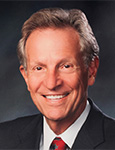The Volunteer Who Had a Life-changing Lunch in Thailand — Paul Strasburg (Thailand)
A Profile in Citizenship
by Jeremiah Norris (Colombia 1963–64)
A back story to that luncheon

Paul Strassburg
Paul Strasburg graduated magna cum laude in History from Stanford University in 1964. He then went on to be a Peace Corps Volunteer in Thailand from 1964 to 1966. Upon returning home, he attended Yale Law School before moving on to Princeton University where he earned an MPA in 1969.
Afterwards, Paul worked for the Ford Foundation in New York City as a Program Officer for Latin America and the Caribbean where he monitored grants in Education, Agriculture, and Rural Development, initiating the Foundation’s first program of grants in human nutrition. From 1974 to 1979, he worked with the Vera Institute of Justice in NYC, establishing a job development program for ex-addicts and ex-offenders. He also directed Vera’s Paris office, coordinating research in conjunction with the French Ministry of Justice and was awarded the Medalle Penitertiare by the Ministry. Then, as Assistant to the Mayor of New York City, Paul created the City’s Department of Juvenile Justice, responsible for detention of arrested juveniles through disposition of their cases and served as its first Commissioner.
In the 1980s and 1990s, Paul was Executive Director and Chairman of the Board of Volunteers in Asia. There, he developed the first American volunteer program in Vietnam following the war. Paul served as Board Chair for International Rivers in Berkeley, CA, which protects rivers and defends the rights of communities that depend on them. He is also the Founding Member of the Massachusetts Woodlands Cooperative, dedicated to protecting the forest environment and supporting local economies.
The Lunch
So much for what Paul did to support Peace Corps’ 3rd Goal — but how did he start on that pathway! On a hot day in 1965, Paul was having lunch with his Thai counterparts near the village of Ban Nong Boa. A man in a civil service uniform approached his table, introducing himself as a teacher and told him his story. With no school, this teacher was forced to teaching his students outside. When it rained, school would be cancelled. Could Paul help him build a school?
In what proved to be a pivotal moment in his life, Paul agreed to find out what he could do. Working through U. S. non-profits, he was able to connect with high school students on Long Island, NY, who took on the project as a fundraiser. In a short amount of time, the students raised $2,000 for the Thai teacher to build his school. In 1966, that school was dedicated. Of his role in this, Paul commented: “my only job was to ask questions, scope out the project, and then be responsible for doling out the money as bills came in. The community did all the work.”
Some four decades after his Volunteer experience, Paul returned to the village. He was surprised to see that not just the four room schoolhouse had been built, but with just an investment of $2,000, the teacher’s success had expanded beyond serving students, to spurring on economic development in the community. What was reinforced to Paul on that day was this: “Small can in fact be big.”
With that deep impression, Paul founded the International Development Exchange (IDEX) in 1985 on the belief that in the power of small scale, community-driven projects to combat extreme poverty and inequality in developing nations. In the beginning, IDEX was a volunteer-based program that provided financial assistance to initiatives and projects that originated from communities in the Global South.
In time, paid staff was needed to handle requests, ballooning from all over. Since its founding, IDEX has supported more than 500 grass-roots, community-led projects in 33 countries in Africa, Asia and Latin America with multi-year general support commitments, reaching over 1.2 million people. IDEX demonstrated what Paul discovered years ago: that local solutions have global impact. In 2016, in changing times, IDEX went through a re-branding process to become Thousand Currents, in order to align more closely with its work. It wanted a name that reflected who it is as an organization focused on exchanging grassroots brilliance to become part of a moving interdependent global picture.
Thousand Currents is a powerful concept from the natural world. ‘Currents’ like grassroots leaders and locally-led solutions have force and direction. “Thousand” includes you, our colleagues and friends. It also reflects the potential that in the multitude when small, yet formidable pockets of people power come together. Its new name honors the transformational changes in food sovereignty, alternative economies, and climate justice, led by women, youth and Indigenous Peoples in the Global South. As Paul commented on the name change: “Thousand Currents continues to have the courage to learn — so it expands, and so can we.”
A force multiplier
That long ago luncheon in Thailand changed Paul’s life forever. After his PC Volunteer days were over, that school proved to be a force multiplier, initiating his 3rd Goal activities, first in NYC before moving on internationally with IDEX in 33 countries — and then seeing it morph into the basis for a re-branded Thousand Currents. Now, it is part of a moving interdependent picture in development assistance. For these highly commendable achievements, Paul most certainly is entitled to A Profile in Citizenship.
No comments yet.
Add your comment